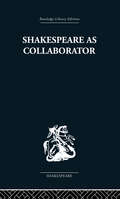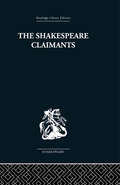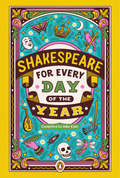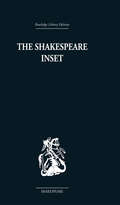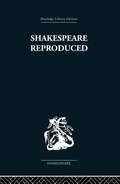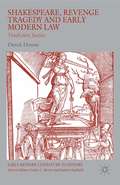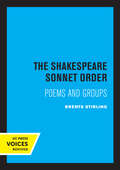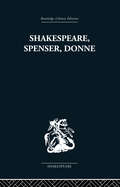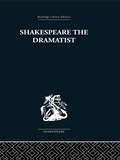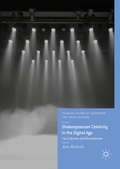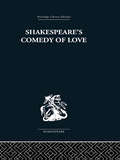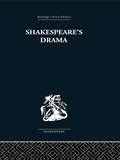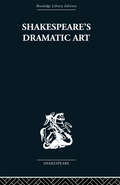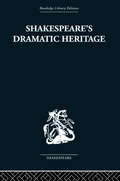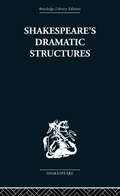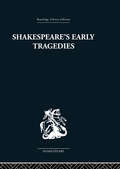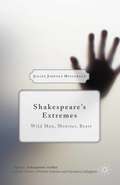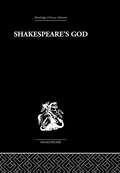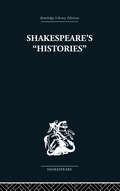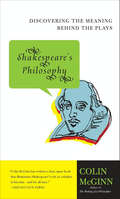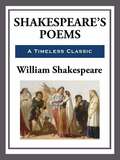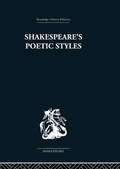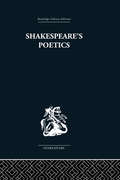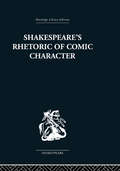- Table View
- List View
Shakespeare as Collaborator
by Kenneth MuirThis edition first published in 1960. This book discusses the extent of Shakespeare's collaboration in the plays of Edward III, The Two Noble Kinsmen, Pericles and the lost Cardenio. It includes chapters on the dramatic value of the plays irrespective of authorship.
The Shakespeare Claimants: A Critical Survey of the Four Principal Theories concerning the Authorship of the Shakespearean Plays
by H. N GibsonThis edition first published in 1962. The Shakespeare Claimants is a critical survey of the great controversy that has raged over the authorship of the Shakespearean plays. It provides the general reader with an outline history of this controversy and with a full description and analysis of the main anti-Stratfordian arguments. This book concentrates on the four main claimants: Bacon, Oxford, Derby and Marlowe. The book contains an extensive bibliography and footnotes to guide the reader through the text.
Shakespeare for Every Day of the Year
by Allie Esiri"Shakespeare for Every Day of the Year is not just for Christmas, but for all time." —Helena Bonham CarterA magnificent collection of 365 passages from Shakespeare's works, for the Shakespeare scholar and neophyte alike.Make Shakespeare a part of your daily routine with Shakespeare for Every Day of the Year, a yearlong collection of passages from Shakespeare's greatest works. Drawing from the full spectrum of plays and sonnets to mark each day of the year, whether it's a scene from Hamlet to celebrate Christmas or a Sonnet in June to help you enjoy a summer's day. There are also passages to mark important days in the Shakespeare calendar, both from his own life and from his plays: You'll read a pivotal speech from Julius Caesar on the Ides of March and celebrate Valentine's day with a sonnet. Every passage is accompanied by an enlightening note to teach you its significance and help you better appreciate the timelessness and poetry of Shakespeare's words. Shakespeare for Every Day of the Year will give you a thoughtful way reflect on each day, all while giving you a deeper appreciation for the most famous writer in the English language.
The Shakespeare Inset: Word and Picture
by Francis BerryWhat is the relation between the language being heard and the picture being simultaneously exhibited on the stage? Typically there is an identity between sound and sight, but often there is a divergence between what the audience hears and what is sees. These divergences are 'insets' and examines the motives, mechanics and poetic qualities of these narrative poems embedded in the plays.
Shakespeare Reproduced: The text in history and ideology
by Jean E Howard Marion F O’ConnorFirst published in 1987. The essays in Shakespeare Reproduced offer a political critique of Shakespeare's writings and the uses to which those writings are put Some of the essays focus on Shakespeare in his own time and consider how his plays can be seen to reproduce or subvert the cultural orthodoxies and the power relations of the late Renaissance. Others examine the forces which have produced an overtly political criticism of Shakespeare and of his use in culture. Contributors include: Jean E Howard and Marion O'Connor, Walter Cohen, Don E Wayne, Thomas Cartelli, Peter Erickson, Karen Newman, Thomas Moisan, Michael D Bristol, Thomas Sorge, Jonathan Goldberg, Robert Weimann, Margaret Ferguson.
Shakespeare, Revenge Tragedy and Early Modern Law: Vindictive Justice (Early Modern Literature in History)
by Derek DunneThis book, the first to trace revenge tragedy's evolving dialogue with early modern law, draws on changing laws of evidence, food riots, piracy, and debates over royal prerogative. By taking the genre's legal potential seriously, it opens up the radical critique embedded in the revenge tragedies of Kyd, Shakespeare, Marston, Chettle and Middleton.
The Shakespeare Sonnet Order: Poems and Groups
by Brents StirlingThis title is part of UC Press's Voices Revived program, which commemorates University of California Press’s mission to seek out and cultivate the brightest minds and give them voice, reach, and impact. Drawing on a backlist dating to 1893, Voices Revived makes high-quality, peer-reviewed scholarship accessible once again using print-on-demand technology. This title was originally published in 1968.
Shakespeare, Spenser, Donne: Renaissance Essays
by Frank KermodeFirst published in 1971. This collection of essays discusses some of the central works and areas of literature in the Renaissance period of cultural history. Contents include: Spenser and the Allegorists; The Faerie Queene, I and V; The Cave of Mammon; The Banquet of Sense; John Donne; The Patience of Shakespeare; Survival fo the Classic; Shakespeare's Learning; The Mature Comedies; The Final Plays.
Shakespeare the Dramatist: And other papers
by Una Ellis-FermorFirst published in 1961. On her death, Professor Ellis-Fermor left behind some uncollected essays and part of a book on Shakespeare the Dramatist. This volume includes the chapters of the unfinished work and three further articles on Shakespeare. It discusses Shakespeare's methods with regard to plot, character, diction, and imagery and it contains comparative analysis of Shakespeare with other dramatists, including Ibsen and Corneille.
Shakespearean Celebrity in the Digital Age: Fan Cultures and Remediation (Palgrave Studies in Adaptation and Visual Culture)
by Anna BlackwellThis book offers a timely examination of the relationship between Shakespeare and contemporary digital media. By focusing upon a variety of ‘Shakespearean’ individuals, groups and communities and their ‘online’ presence, the book explores the role of popular internet culture in the ongoing adaptation of Shakespeare’s plays and his general cultural standing. The description of certain performers as ‘Shakespearean’ is a ubiquitous but often throwaway assessment. However, a study of ‘Shakespearean’ actors within a broader cultural context reveals much, not only about the mutable face of British culture (popular and ‘highbrow’) but also about national identity and commerce. These performers share an online space with the other major focus of the book: the fans and digital content creators whose engagement with the Shakespearean marks them out as more than just audiences and consumers; they become producers and critics. Ultimately, Digital Shakespeareans moves beyond the theatrical history focus of related works to consider the role of digital culture and technology in shaping Shakespeare’s contemporary adaptive legacy and the means by which we engage with it.
Shakespeare's Comedy of Love
by Alexander LeggattFirst published in 1987. This study removes some of the critical puzzles that Shakespeare's comedies of love have posed in the past. The author shows that what distinguishes the comedies is not their similarity but their variety - the way in which each play is a new combination of essentially similar ingredients, so that, for example, the boy/girl changes in The Merchant of Venice are seen to have a quite different significance from those in As You Like It.
Shakespeare's Drama
by Una Ellis-FermorFirst published in 1980. This collection of essays by the first General Editor of the New Arden Shakespeare brings together the best of Ellis-Fermor's Shespearean criticism, in addition to outstanding essays on Coriolanus and Troilus and Cressida. Collected and edited by Kenneth Muir, the book is prefaced by an appreciation of Ellis-Fermor's work.
Shakespeare's Dramatic Art: Collected Essays
by Wolfgang ClemenFirst published in 1972. Studying Shakespeare's 'art of preparation', this book illustrates the relationship between the techniques of preparation and the structure and theme of the plays. Other essays cover Shakespeare's use of the messenger's report, his handling of the theme of appearance and reality and the basic characteristics of Shakespearian drama.
Shakespeare's Dramatic Heritage: Collected Studies in Mediaeval, Tudor and Shakespearean Drama
by Glynne WickhamShakespeare's Dramatic Heritage shows that the drama of Elizabethan and Jacobean England is deeply indebted to the religious drama of the Middle Ages and represents a climax, in secular guise, to mediaeval experiment and achievement rather than a new beginning. This is fully examined in terms of dramatic literature as well as in terms of theatres, stages and production conventions. The plays studied include: Richard II, A Midsummer Night's Dream, Hamlet, Macbeth, Coriolanus, The Winter's Tale and Marlowe's King Edward II.
Shakespeare's Dramatic Structures
by Anthony BrennanFirst published in 1986. The focus of this book is the dramatic strategies of scenic repetition and character separation. The author traces the way in which Shakesperare often presents recurring gestures, dramatic interactions, and complex scenic structures at widely separated intervals in a play - thereby providing an internal system of cross-reference for an audience. He also examines the way in which Shakespeare increases the dramatic voltage in central relationships by limiting the access key characters have to each other on stage. These strategies, it is argued, are indelible marks of Shakespeare's craftsmanship which survive all attempts to obliterate it in many modern productions.
Shakespeare's Early Tragedies
by Nicholas BrookeFirst published in 1968. Shakespeare's Early Tragedies contains studies of six plays: Titus Andronicus, Richard III, Romeo and Juliet, Richard II, Julius Caesar and Hamlet. The emphasis is on the variety of the plays, and the themes, a variety which has been too often obscured by the belief in a single 'tragic experience'. The kind of experience the plays create and their quality as dramatic works for the stage are also examined. These essays develop an understanding of Shakespeare's use of the stage picture in relation to the emblematic imagery of Elizabethan poetry.
Shakespeare’s Extremes: Wild Man, Monster, Beast (Palgrave Shakespeare Studies)
by Julián Jiménez HeffernanShakespeare's Extremes is a controversial intervention in current critical debates on the status of the human in Shakespeare's work. By focusing on three flagrant cases of human exorbitance - Edgar, Caliban and Julius Caesar - this book seeks to limn out the domain of the human proper in Shakespeare.
Shakespeare’s Global Sonnets: Translation, Appropriation, Performance (Global Shakespeares)
by Jane Kingsley-Smith W. Reginald Rampone Jr.This edited collection brings together scholars from across the world, including France, Italy, Germany, Hungary, Japan, the USA and India, to offer a truly international perspective on the global reception of Shakespeare’s Sonnets from the 18th century to the present. Global Shakespeare has never been so local and familiar as it is today. The translation, appropriation and teaching of Shakespeare’s plays across the world have been the subject of much important recent work in Shakespeare studies, as have the ethics of Shakespeare’s globalization. Within this discussion, however, the Sonnets are often overlooked. This book offers a new global history of the Sonnets, including the first substantial study of their translation and of their performance in theatre, music and film. It will appeal to anyone interested in the reception of the Sonnets, and of Shakespeare across the world.
Shakespeare's God: The Role of Religion in the Tragedies
by Ivor MorrisFirst published in 1972. Shakespeare's God investigates whether a religious interpretation of Shakespeare's tragedies is possible. The study places Christianity's commentary on the human condition side by side with what tragedy reveals about it. This pattern is identified using the writings of Christian thinkers from Augustine to the present day. The pattern in the chief phenomena of literary tragedy is also traced
Shakespeare's History: Mirrors of Elizabethan Policy.
by Lily B CampbellFirst published in 1947 in the USA. This edition reprints the first UK edition of 1964. Published to critical acclaim, the central argument of this book is that the historical play must be studied as a genre separate from tragedy and comedy. Just as there is in Shakespearean tragedies a dominant ethical pattern of passion opposed to reason, so there is in the history plays a dominant political pattern characteristic of the political philosophy of the age. From the 'troublesome reign' of King John to the 'tragical doings' of Richard III, Shakespeare wove the events of English history into plots of universal interest.
Shakespeare's Philosophy: Discovering the Meaning Behind the Plays
by Colin McGinnShakespeare’s plays are usually studied by literary scholars and historians and the books about him from those perspectives are legion. It is most unusual for a trained philosopher to give us his insight, as Colin McGinn does here, into six of Shakespeare’s greatest plays–A Midsummer Night’s Dream, Hamlet, Othello, Macbeth, King Lear, and The Tempest. In his brilliant commentary, McGinn explores Shakespeare’s philosophy of life and illustrates how he was influenced, for example, by the essays of Montaigne that were translated into English while Shakespeare was writing. In addition to chapters on the great plays, there are also essays on Shakespeare and gender and his plays from the aspects of psychology, ethics, and tragedy.As McGinn says about Shakespeare, “There is not a sentimental bone in his body. He has the curiosity of a scientist, the judgment of a philosopher, and the soul of a poet.” McGinn relates the ideas in the plays to the later philosophers such as David Hume and the modern commentaries of critics such as Harold Bloom. The book is an exhilarating reading experience, especially for students who are discovering the greatest writer in English.
Shakespeare's Poems
by William ShakespeareA collection of Shakespeare's Sonnets and A Lover's Complaint.
Shakespeare's Poetic Styles: Verse into Drama
by John BaxterFirst published in 1980. At their most successful, Shakespeare's styles are strategies to make plain the limits of thought and feeling which define the significance of human actions. John Baxter analyses the way in which these limits are reached, and also provides a strong argument for the idea that the power of Shakespearean drama depends upon the co-operation of poetic style and dramatic form. Three plays are examined in detail in the text: The Tragedy of Mustapha by Fulke Greville and Richard II and Macbeth by Shakespeare.
Shakespeare's Poetics: In relation to King Lear
by Russell A FraserFirst published in 1962. This volume gives as complete an account as possible of the Shakespearian experience, particularly in terms of one play, King Lear, but in general against the context of all of Shakespeare's work and that of the age in which it was created. Chapters cover: King Lear in the Renaissance; Providence; Kind; Fortune; Anarchy and Order; Reason and Will; Show and Substance; Redemption and Shakespeare's Poetics.
Shakespeare's Rhetoric of Comic Character: Dramatic Convention In Classical And Renaissance Comedy
by Karen NewmanFirst published in 1985. In this revisionist history of comic characterization, Karen Newman argues that, contrary to received opinion, Shakespeare was not the first comic dramatist to create self-conscious characters who seem 'lifelike' or 'realistic'. His comic practice is firmly set within a comic tradition which stretches from Plautus and Menander to playwrights of the Italian Renaissance.
